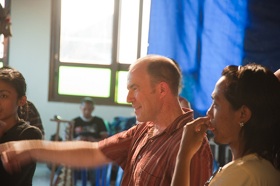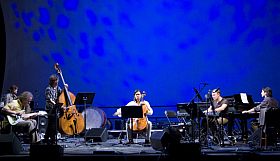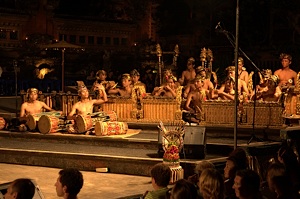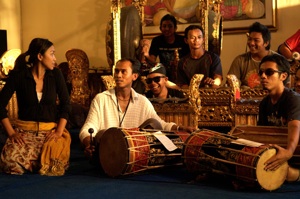A few years ago, Evan Ziporyn’s mother called him to report a strange occurrence while she slept. “I just had this dream,” she said, “that you wrote an opera about Colin McPhee.” They chatted for a while, and after she hung up, Ziporyn thought, “Y’know, that’s a really good idea.” The seed planted in 2001 finally comes to fruition next week when Cal Performances stages the American premiere of Ziporyn’s opera A House in Bali, directed by Jay Scheib, at UC Berkeley's Zellerbach Hall on Sept. 26.

His mother’s suggestion of McPhee as an opera subject couldn’t have entirely surprised Ziporyn, who regards himself as a spiritual descendant of that pioneering Canadian composer. Beguiled by field recordings of Balinese music he had heard in New York, McPhee and his wife, an anthropologist, moved to the pastoral Indonesian island in the early 1930s. He built a house there, conducted the first comprehensive ethnomusicological studies of its astonishing gamelan (percussion orchestra) music, composed proto-“world music” that fused Western orchestral and Balinese music (the most famous being his 1936 Tabuh-Tabuhan: Toccata for Orchestra), and eventually wrote two important books about the island and its culture, including the memoir whose title gives Ziporyn’s new opera its name.
However, a variety of personal and global pressures — McPhee’s deteriorating relationship with a teenage protégé he met there, and with his wife (whom he divorced on their return to New York); his emerging recognition of his own repressed homosexuality and the Dutch colonial crackdown on homosexuals that netted his friend the painter Walter Spies; the looming Japanese invasion of the archipelago — forced McPhee to leave Bali in 1938.
He became part of the fertile contemporary music scene in the New York City of the 1940s, living with Leonard Bernstein and Benjamin Britten (whom he introduced to gamelan music). But McPhee left his muse in Bali: His composing deteriorated as his alcoholism deepened. McPhee taught ethnomusicology at UCLA (home of the first resident Balinese gamelan orchestra in the U.S.) in the 1950s, and died in 1964. He never returned to Bali, yet never escaped its spell.
Discovering Bali on LP
Like McPhee, Ziporyn is a composer perpetually pulled between East and West. Born in the middle of the country (Chicago), he headed east (to Yale) for college. Then, half a century after McPhee encountered the seductive shimmer of Balinese gamelan music, Ziporyn, too, was inspired by a recording of it — the famed Nonesuch recording Music From the Morning of the World.
At that moment 30 years ago, enchanted by the music’s sharp accents and effervescent syncopations, Ziporyn resolved to go to the source. His drum teacher in Bali was Made Lebah, who had been McPhee’s driver and assistant. On his return, Ziporyn headed to UC Berkeley for composition study in the mid-1980s, and joined the Bay Area’s new Gamelan Sekar Jaya, performing Balinese music with what became the West’s preeminent gamelan ensemble. He accompanied the group on its celebrated 1985 tour to the music’s homeland, and returned later as a Fulbright scholar.
After studying Balinese music for a decade, Ziporyn began to compose in that style, including early 1990s works for Sekar Jaya that included Western instruments. Around the same time, he began performing with the Bang on a Can All-Stars, the acclaimed New York–based composers’ collective. A year later, Ziporyn cofounded Gamelan Galak Tika, a group dedicated to new music, in Boston, where he teaches at MIT.
Since then, he’s blazed trails as a new-music clarinetist and performed with the Silk Road Ensemble, Steve Reich Ensemble, and Ethel. What ensued were awards, fellowships, recordings, and collaborations (with Brian Eno, Paul Simon, Meredith Monk, Philip Glass, Ornette Coleman, and more), along with commissions galore, involving both Western and non-Western instruments, especially gamelan, and occasionally including electric or electronic instruments. His multicultural works culminated in a 2005 performance of his opera Shadow Bang (2001), at the renowned Bali Arts Festival with Galak Tika and Balinese dalang (puppet master and musician) Wayan Wija, and the 2006 release of the scintillating CD Frog’s Eye, performed by the Boston Modern Orchestra Project.
All the while, Ziporyn was haunted by his predecessor’s example. Both composers have tried to find a synthesis of Balinese and Western classical music. “McPhee is both the model and ‘there but for the grace of God go I,’” Ziporyn explains, “because nothing I’ve done with Balinese music could have happened without him as a trailblazer. But at the same time, the last thing I want is for my life to be anything like his, because he was so unhappy. He did this incredible work in Bali and then, when he got back to America, his life and career were difficult. He never really resolved how to put these cultures together.”
Making Sense of Colin McPhee
Maybe telling McPhee’s story would help Ziporyn work through the similar challenges he’d faced, being caught between the competing gravitational pulls of radically different cultures. Ziporyn remembered being overwhelmed by the power of traditional Balinese music, yet still feeling alienated from it. How could he avoid the conflicts that he suspected had creatively paralyzed McPhee after he left Bali? “I will always remain the outsider,” McPhee had written, feeling unable to fully enter the Balinese spiritual world and unable to forge an ultimately satisfactory synthesis between the two music cultures that tugged at him.
Evan Ziporyn's "A House in Bali"
Excerpt, Act 2 Scene 2
McPhee’s story also provided a convenient example of the collision of cultures that, the opera suggests, may never be entirely reconcilable. “I still hadn’t quite found how to make that leap and get a Western audience to understand what this is all about,” Ziporyn admits. “McPhee’s story was so conflicted — triumphant on one level and tragic on the other — that [the opera] would be a way to help people understand, to relate to this character who was pulled back and forth and found a way to make it work for a while” but ultimately couldn’t resolve the contradictions. “Musically, it was a way to bring it all together.”
To tell the story, Ziporyn and librettist Paul Schick relied heavily on McPhee’s memoir — “Ninety percent of the dialogue comes straight out of the book,” he says — and included as characters two other famous Western visitors in Bali from the time McPhee was there: Walter Spies, his painter friend; and the anthropologist Margaret Mead. Together, Ziporyn says, they represent three different Western approaches to that entrancing isle: Embrace it and thereby ultimately change it (Spies “went native” and encouraged the locals to sell the idealized nature paintings you see everywhere in the city of Ubud and to perform the kecak monkey chant for tourists), or analyze it from a distance (Mead examined the culture through Western psychological and anthropological lenses, then left), or appropriate it (McPhee used Balinese melodies and structures in his compositions) without ever quite understanding it.
The main narrative traces McPhee’s fluctuating relationship with Sampih, the teenager he was smitten by and adopted as a protégé. Because it relies on his own memoir as a source, the opera likewise skirts the issue of McPhee’s homosexuality. Tensions rise as Japanese secret agents appear, preparing for the imminent invasion of Indonesia. Ultimately, McPhee leaves the island forever.
“I was trying to ... find this parallel,” Ziporyn says. “What he was doing with the culture is the same thing that happens with the boy: He falls in love with an exotic thing and makes a deep and earnest attempt to get to know it and preserve it and develop a relationship with it, and at a certain point realizes it’s not as innocent as he thought it was.”
Combining Classical Traditions
 Ziporyn deployed his musical forces — the players stay onstage throughout, visually embodying the cultural contrasts — in a way that reflects this theme. Gamelan Salukat is led by Cudamani founder Dewa Ketut Alit and comprises 16 young players from Bali, chosen partly for their musical openness to new ideas, and partly because Ziporyn wanted that look of innocent purity that so enchanted Westerners, from Debussy to modern tourists. Then the Bang on a Can All Stars (consisting of Ziporyn, percussionist David Cossin, cellist Felix Fan, bassist Robert Black, and guitarist Derek Johnson, with Ning Yu on keyboard and guest violinist Todd Reynolds) play in their modern Western style. Eventually they combine, with electric guitars, violins, and cellos playing alongside the Balinese instruments, though the cross-cultural reconciliation proves ephemeral, as it did for McPhee.
Ziporyn deployed his musical forces — the players stay onstage throughout, visually embodying the cultural contrasts — in a way that reflects this theme. Gamelan Salukat is led by Cudamani founder Dewa Ketut Alit and comprises 16 young players from Bali, chosen partly for their musical openness to new ideas, and partly because Ziporyn wanted that look of innocent purity that so enchanted Westerners, from Debussy to modern tourists. Then the Bang on a Can All Stars (consisting of Ziporyn, percussionist David Cossin, cellist Felix Fan, bassist Robert Black, and guitarist Derek Johnson, with Ning Yu on keyboard and guest violinist Todd Reynolds) play in their modern Western style. Eventually they combine, with electric guitars, violins, and cellos playing alongside the Balinese instruments, though the cross-cultural reconciliation proves ephemeral, as it did for McPhee. Combining such disparate groups posed daunting musical challenges, most obviously in tuning. Western instruments use standard 12-tone equal temperament, which is quite different from the more “natural” tunings used in Bali. But Ziporyn, an old hand at mediating such differences, uses them to make dramatic points. Although, like many composers of his generation and younger, Ziporyn has hitherto preferred a more natural, pop-oriented singing style, this time he opts for a Western operatic lyric tenor, the better to parallel the similarly artificial and florid Balinese vocal style that otherwise is entirely different. All told, the music traverses a range of territory between Western and Balinese sounds.
The project faced other obstacles, as well. The recession stifled some financing; the June premiere in Bali encountered the usual differing conceptions of time (both in the music and in logistical areas like showing up for rehearsal at a given time); untimely illnesses; and cultural misunderstandings. Still, it somehow all came together, and the

performance on the steps of Ubud’s temple of Saraswati, goddess of art and culture, not far from where the events of McPhee’s memoir occurred, made a strong impression on audiences and performers alike. (In Berkeley, sans on-location scenery, Balinese dancers will sway on a set that suggests the island in the pretouristy 1930s.)
For Ziporyn, conducting some of his favorite musicians as they performed his original music in the very place that so inspired both him and McPhee, and then bringing it back to his earlier home in the Bay Area, represents a closing of the circle he began circumnavigating three decades ago. In creating A House in Bali, Ziporyn also resolved the question — for himself, anyway — that McPhee never could.
“Rather than come up with an answer like ‘This is the relationship of these two musics,’” he says, “it was more that I finally got the chance to really explore quite a number of permutations and find ways to put them together and drag them apart,” thereby reflecting the story’s theme. The goal he’d sought for 30 years turned out not to be a single, mythical holy grail of musical unity but instead diversity itself, allowing the two musical worlds to combine in various ways while retaining their integrity. For now at least it’s a satisfying resolution to a career-long quest — a composer’s dream come true. And his mother’s, too.

